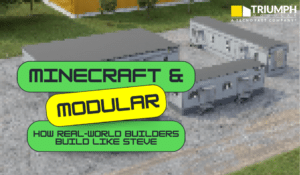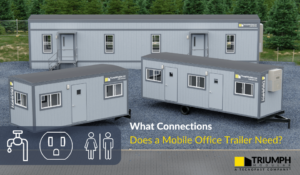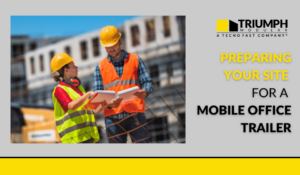How Much Does It Cost to Rent a Field Office for Highway Construction Projects?
Renting or leasing a field office is a must for highway construction projects.
Although different states will have different specifications or requirements, a field office provides construction crews with a home base for further planning, break times, and more.
If you’re gearing up for a highway construction project, you might wonder how much does it cost to rent a field office?
With over 40 years of experience in modular construction, one of our primary use cases for mobile office trailers is for field offices—we can help you figure out costs and what factors contribute to the price!
What Factors Affect the Cost of Renting a Field Office?
When budgeting for your field office rental, there are five primary factors that you’ll need to consider:
- Size
- Length of rental
- Type of building
- Transportation
- Set up and knockdown
1. Field Office Size
The first consideration for your field office rental costs is the size of the building you’re renting—as a basic rule of thumb, the bigger your field office, the more it’ll cost.
There are two things at play here. First is the field office specifications outlined by your state—depending on where you’re located and what you’re using the field office for, you may need a specific size to meet the requirements.
Once you’ve figured out the size of the field office you’ll need based on the specs for your state, you may decide to continue with a larger rental. This can help with storage or having additional space for workers, depending on your needs.
2. Length of Rental For Field Offices
The length of your rental contributes to the overall cost of renting a field office—as you’ve likely figured out, longer rentals will typically cost more.
However, it’s not always that simple. Depending on the length of your project, locking in a longer term, such as a nine or twelve-month lease, can help you avoid more turbulent pricing associated with a shorter rental term, such as three to six months.
Your best bet is always to consult the provider of your field office rental—they can help you come up with the best course of action that will work best for you.
3. Field Office Types
Depending on the provider of your field office, you may have different types of field offices to choose from that vary in quality.
If all you need is a field office with the bare minimum to meet your state’s requirements, you’ll likely pay less. If you prefer having a premium field office building with additional amenities, your rental costs will be higher.
4. Transportation Costs Associated With Field Offices
With a field office delivered to your location, you’ll need to factor in the transportation costs.
The general rule is that the further the delivery location, the more you’ll pay in delivery costs.
However, there are some other considerations with transportation.
First is the size of your field office—an 8-foot-wide office will typically cost less to deliver than a 12-foot-wide office since it’s easier to load and transport in most situations.
There’s also in-state versus out-of-state delivery. Different states have highway permit fees that need to be paid, and escorts and flaggers may also be required depending on the trailer size. For example, a 12-foot-wide office trailer will often need a highway escort—another cost that you’ll need to consider if you choose a provider out-of-state.
Last is island delivery—there are fees for ferry time and additional time required by delivery drivers when the location is on an island.
5. Setup and Knockdown of Field Offices
Most providers of field office rentals will have a setup and knockdown fee. For setup, this will include things like blocking and leveling the office. In areas with high winds, you may want to consider tie-downs or anchors for maximum safety.
There’s also the knockdown fee to consider at the end of the project—this will usually depend on the size of your field office.
Field Office Add-ons
Depending on your chosen company, you may have additional options available for your new office trailers, including steps, ramps, or high-quality furniture.
It’s important to note that mobile office trailers do not offer ground-level access for entry. Therefore, you need to consider the entry options for your office trailer. State field office specifications may state that an ADA ramp is required, which would add to the cost. You may also decide that you want some extras that are not a requirement, such as a canopy over the steps or interior furniture.
Triumph Modular’s Solutions packages are a great example of add-ons that can benefit your field office rental. These packages include everything from office furniture to break room essentials—it all depends on what you’re looking for.
Triumph Modular Field Office Rental Options
So, all things considered: How much does it cost to rent a field office?
While pricing can vary based on several factors, Triumph Modular offers a range of field office sizes and configurations to meet the needs of different job sites. From compact single-wide units to larger double-wide offices with optional restrooms, we provide flexible options to suit both short- and long-term projects.
To get an accurate estimate tailored to your project requirements—including size, location, and any add-ons—our team is here to help. Contact us to discuss your specific needs and receive a custom quote.
Need the Specifications and Requirements for Field Offices in Your State?
Knowing field office rental costs is important—but first, you’ll want to know the specifications for your state.
Our ebook, Modular Field Offices For DOT Projects, outlines everything you need to know about field office specs for nine different states—no more internet searches or endless phone calls.
Download our ebook today!





